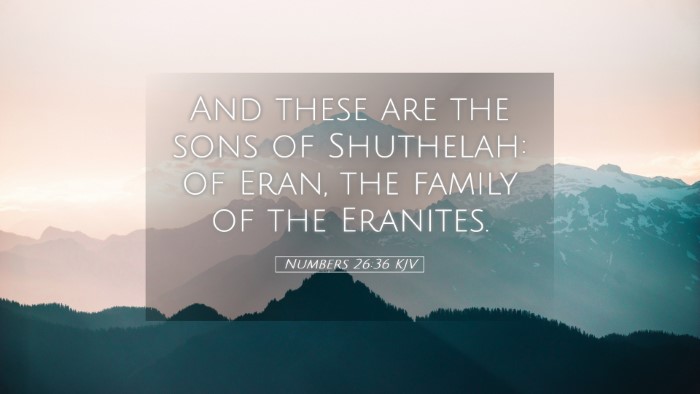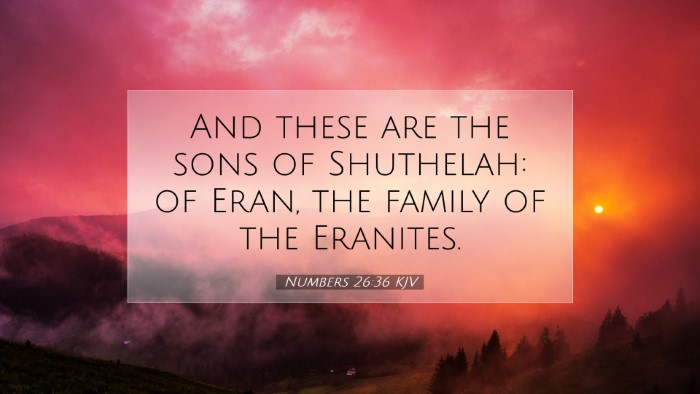Commentary on Numbers 26:36
Numbers 26:36 states: "These are the sons of Shimeih: by their names, according to their families." This verse is part of a broader context in which Moses is conducting a census of the Israelite tribes, detailing the family lines and their respective heads. Below is a synthesis of insights from respected public domain commentaries, providing a meaningful exploration of the theological and historical implications of this passage.
Context and Historical Background
Matthew Henry emphasizes the significance of the census, noting that it serves not only to catalog the tribes but also to affirm God’s promise and faithfulness. The mention of the families highlights the importance placed on lineage and heritage within Israelite society. The census reflects both a means of governance and an acknowledgment of God's providence as He prepares His people for the Promised Land.
Albert Barnes elaborates on the relevance of family names in the defined tribes, indicating that these genealogies served as a means of determining inheritance and property allocations. This careful documentation reveals God's desire for order and accountability among His people, ensuring that each family's legacy is recognized. Furthermore, such a census is motivated by the need for military organization, as each family would contribute to the larger communal responsibilities.
Theological Insights
Adam Clarke points out that God's faithfulness is evident in the preservation of families throughout these records. The recounting of Shimeih’s descendants signifies God's ongoing involvement in the lives of His people. Clarke posits that the specificity of names serves to assure the Israelites that their identity is firmly rooted in God's design and plan. Each family has a role within the collective mission of Israel, and thus, claims to identity and purpose are firmly established through these genealogies.
Lessons for the Contemporary Church
- The Importance of Community: Just as the Israelite families had distinct identities within the larger community, contemporary believers are called to understand their unique roles in the body of Christ. Each member, much like the families listed in Numbers, contributes to the collective mission of the Church.
- Recognition of Heritage: Understanding one's spiritual and familial heritage can provide insight into God’s workings through generations. This encourages believers to reflect on their own spiritual lineage and the impact it has on their faith journey.
- God's Order and Provision: The systematic approach of the census illustrates that God is a God of order. As He managed the logistics of His people in the Old Testament, He continues to provide structure and care for the Church today.
Practical Applications
In pastoral ministry, Numbers 26:36 serves as a reminder of the responsibility to know and nurture the families within the congregation. Leaders are called to facilitate relationships that honor individual family dynamics while fostering a sense of unity within the Church.
Students and scholars are encouraged to delve deeper into the genealogies found throughout Scripture, as these records hold the key to understanding the movement of God’s people across history. The nuances of these genealogical accounts provide rich material for theological reflection and discourse.
Conclusion
Numbers 26:36, while appearing as a simple genealogical note, encapsulates profound themes of identity, community, and divine faithfulness. The insights gathered from public domain commentaries highlight the relevance of this passage for anyone seeking to understand God’s purpose in the history of His people. In recognizing the lineage of Shimeih, we are reminded that every believer’s story is interwoven into a larger narrative that culminates in the redemptive work of Christ.


